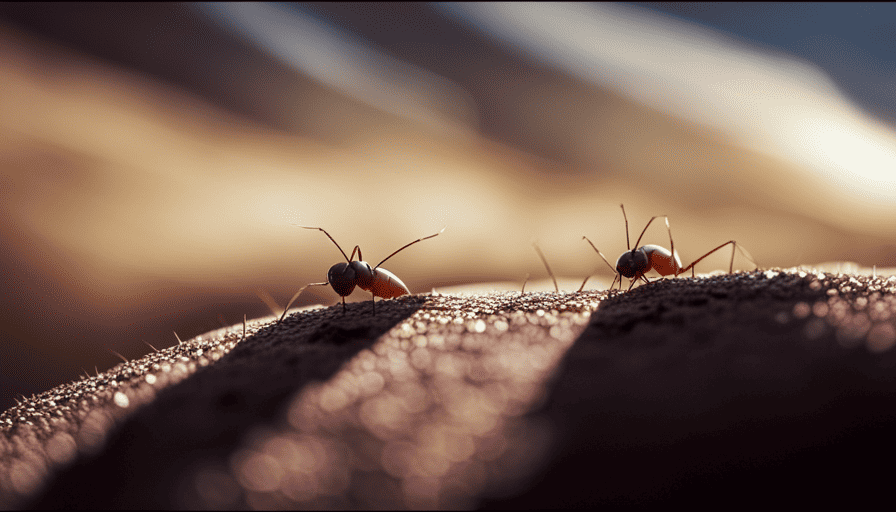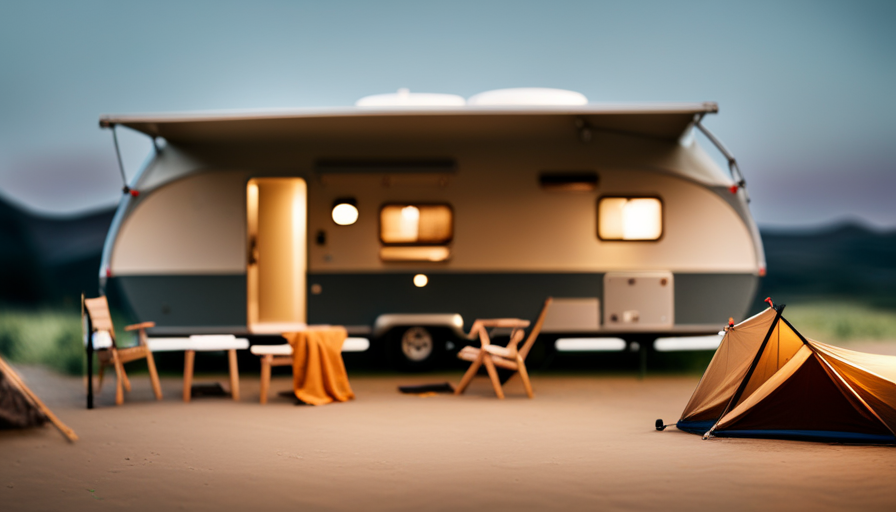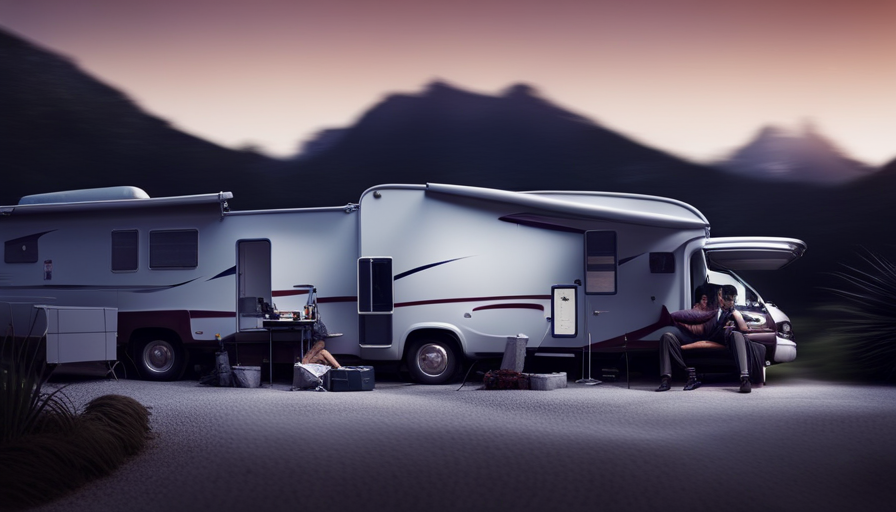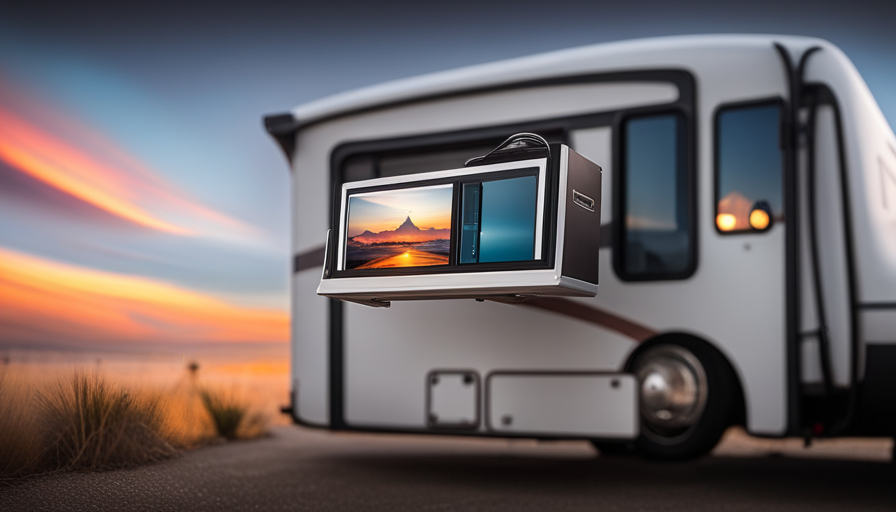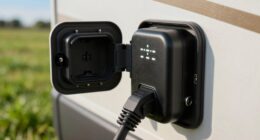Have you ever experienced the invasion of tiny, six-legged pests in the walls of your RV? These small explorers, commonly known as ants, can quickly become a nuisance if not dealt with effectively.
But fear not, for I am here to guide you through the process of eliminating these pesky creatures from your sanctuary on wheels.
In this informative article, we will delve into the world of ant control, specifically focusing on the camper walls. By identifying the ant species infesting your walls, locating and sealing entry points, and utilizing natural ant repellents, you can reclaim your camper from these unwanted guests.
But the battle doesn’t end there. We will also explore the effective use of ant traps, insecticidal sprays or powders, and even the option of consulting a professional exterminator. By regularly monitoring and maintaining a clean camper, and implementing preventive measures, you can ensure that future ant infestations are kept at bay.
So, let’s embark on this ant-exterminating journey together and restore peace and tranquility to your beloved camper!
Key Takeaways
- Sealing cracks and openings in camper walls, windows, doors, and floors is essential to prevent ant entry.
- Removing food sources and keeping the camper clean and free of crumbs or spills is crucial in preventing ant infestations.
- Using natural ant repellents like vinegar, lemon juice, or peppermint oil can help deter ants from entering the camper.
- Implementing ant baits formulated for specific ant species and placing them in common ant areas can effectively control ants and their colonies.
Identify the Ant Species in Your Camper Walls
To effectively address the ant issue in your camper walls, it’s crucial to first identify the ant species that has made its home within them. Identifying ant species in camper walls is essential because different species have different habits and behaviors, which will dictate the most effective approach to getting rid of them.
Some common ant species that may infest camper walls include carpenter ants, odorous house ants, and pavement ants.
To identify the ant species, carefully observe their appearance and behavior. Carpenter ants are typically larger, black or reddish, and they create smooth tunnels in the wood of your camper walls. Odorous house ants emit a strong, unpleasant odor when crushed and are usually small and dark brown. Pavement ants are brown or black and are often found near cracks in pavement or concrete.
Once you have identified the ant species, you can take appropriate measures to prevent ant infestations in your camper walls. This may include sealing any cracks or openings in the walls and windows, removing any food sources that may attract ants, and keeping your camper clean and free of crumbs or spills. By identifying the ant species and implementing preventive measures, you can effectively eliminate ants from your camper walls and ensure a pest-free environment for your travels.
Now, let’s move on to the next section about locating and sealing entry points.
Locate and Seal Entry Points
First, you’ll need to find and seal any sneaky little openings that ants might use to invade your cozy camper. Ants are incredibly skilled at finding even the tiniest cracks and crevices to make their way into your walls. To prevent them from entering, follow these steps:
-
Sealing cracks: Carefully inspect your camper for any cracks or gaps in the walls, windows, doors, or floor. Seal them using caulk or silicone to create a barrier that ants can’t penetrate. Pay special attention to areas where utilities enter your camper, as these are common entry points.
-
Removing food sources: Ants are attracted to food, so it’s important to remove any potential food sources from your camper. Store all food in airtight containers and clean up spills or crumbs right away. Wipe down surfaces with a mixture of vinegar and water to get rid of any food residue that may attract ants.
-
Declutter your camper: Ants love cluttered areas where they can hide and build their nests. Remove any unnecessary items from your camper and keep it clean and organized. This will not only make it less attractive to ants but also make it easier to spot any signs of an ant infestation.
By sealing cracks and removing food sources, you can greatly reduce the likelihood of ants infiltrating your camper. Now, let’s move on to the next step and learn how to clean and declutter your camper to further prevent ant infestations.
Clean and Declutter Your Camper
Now it’s time to tidy up and organize your camper, creating a space that ants won’t find appealing. To effectively minimize ant infestations, it’s important to organize your belongings and eliminate any unnecessary clutter.
Ants are attracted to dark and cluttered spaces, so clearing out any unnecessary items will make it harder for them to find a suitable hiding place. Additionally, make sure to store your food and water sources properly. Keep all food items in tightly sealed containers and avoid leaving any food crumbs or spills behind.
It’s also advisable to keep your camper clean and dry, as ants are attracted to moisture. Regularly check for and fix any leaks or damp areas.
By organizing your belongings and minimizing food and water sources, you’ll create a less attractive environment for ants. This will significantly reduce the chances of them infiltrating your camper.
As we move onto the next section about using natural ant repellents, remember that a clean and organized camper is the first line of defense against these pesky insects.
Use Natural Ant Repellents
Luckily, there are natural ant repellents that can help keep those pesky insects away from your camper. Natural ant repellents are a great alternative to chemical sprays, as they’re safe for both humans and the environment.
One effective homemade ant deterrent is a mixture of vinegar and water. Ants dislike the strong smell of vinegar, so spraying this solution around your camper can help deter them from entering.
Another natural ant repellent is lemon juice. The acidic nature of lemon juice is unpleasant for ants, so wiping down surfaces with lemon juice can help keep them at bay.
Additionally, peppermint oil is a powerful ant deterrent. The strong scent of peppermint masks the pheromones that ants use to communicate, confusing and repelling them. Simply soak a cotton ball in peppermint oil and place it in areas where ants are commonly seen.
These natural ant repellents can be highly effective in keeping ants out of your camper. Once you’ve implemented these repellents, it’s time to set up ant traps to further control the ant population.
Set Up Ant Traps
To effectively combat those pesky ants invading your camper, it’s time to employ the power of ant traps. Ant traps are an excellent ant prevention method that you can easily make yourself. Here are four DIY ant traps that will help you get rid of those unwanted guests:
-
Mix equal parts of borax and sugar to create a borax and sugar mixture. Place the mixture in small containers near ant trails. The ants will be attracted to the sugar but will also ingest the borax, which is toxic to them.
-
Create a vinegar and water solution by mixing equal parts vinegar and water. Spray this solution along ant trails and at entry points. The strong scent of vinegar disrupts their pheromone trails, making it difficult for them to navigate.
-
Sprinkle diatomaceous earth around the camper’s perimeter and ant-infested areas. This natural powder is abrasive and dehydrates ants, ultimately killing them.
-
Soak cotton balls in peppermint oil and place them near ant entry points. The strong smell of peppermint is a powerful deterrent for ants.
By using these DIY ant traps, you can effectively control the ant infestation in your camper. However, if the problem persists, it may be necessary to apply ant baits.
Apply Ant Baits
When it’s time to tackle the persistent ant infestation in your camper, you’ll want to turn your attention to applying ant baits and watch as their secret weapon takes effect.
Ant baits are an effective method for controlling ants because they work by attracting the ants to the bait, which they then carry back to their colony. The bait contains a slow-acting poison that allows the ants enough time to return to their nest and share the bait with the rest of the colony, effectively eliminating the entire population. This method is highly effective because it targets the entire ant colony, including the queen, ensuring long-term control.
Ant baits come in a variety of forms, such as gels, granules, or stations. It is important to choose a bait that is specifically formulated for ants, as different species may have different preferences. Additionally, it is important to place the bait in areas where ants are commonly seen, such as along their foraging trails or near entry points. Be patient, as it may take some time for the ants to find the bait and for it to take effect.
While ant baits are highly effective, it is important to note that they may not be the only solution for controlling ants in your camper. There are alternative ant control methods, such as using insecticidal sprays or powders, which can be used in conjunction with ant baits for maximum effectiveness. These methods provide a more immediate solution and can be used to directly target and kill ants on contact. However, they may not provide long-term control like ant baits do.
Transitioning into the next section about using insecticidal sprays or powders, it is important to consider these alternative methods in your overall ant control strategy.
Use Insecticidal Sprays or Powders
Using insecticidal sprays or powders can be a quick and effective way to target and eliminate ants in your camper. These products contain chemicals that are specifically designed to kill ants on contact. Here are some pros and cons of using insecticidal sprays or powders:
-
Pros:
-
Easy to use: Insecticidal sprays and powders are convenient and can be applied directly to the affected areas.
-
Quick results: These products work fast, killing ants on contact and providing immediate relief from the infestation.
-
Targeted approach: Insecticidal sprays and powders allow you to specifically target the areas where ants are present, ensuring effective treatment.
-
Cons:
-
Chemical exposure: Insecticidal sprays and powders contain chemicals that may be harmful to humans and pets. It’s important to follow the instructions carefully and take necessary precautions.
-
Limited effectiveness: While insecticidal sprays and powders can be effective in killing ants on contact, they may not eliminate the entire ant colony or prevent future infestations.
It’s important to note that there are alternative methods for getting rid of ants in campers. These include natural remedies like vinegar or essential oils, as well as preventive measures such as sealing cracks and removing food sources. If the infestation persists or if you prefer professional assistance, it’s advisable to consult with a professional exterminator.
Consult with a Professional Exterminator
If the ant infestation in your camper persists or if you’d like expert assistance, it’s advisable to consult with a professional exterminator. While DIY ant control methods can be effective in some cases, a professional exterminator has the knowledge and experience to handle more severe infestations. They can assess the extent of the problem and develop a targeted treatment plan to eliminate the ants from your camper walls.
When consulting with a professional exterminator, it’s important to consider the consultation fees. These fees can vary depending on the exterminator’s experience, location, and the severity of the infestation. However, investing in professional help can save you time, money, and frustration in the long run.
During the consultation, the exterminator will likely ask you about the ant problem, its history, and any previous attempts at control. They may also inspect your camper to identify potential entry points and nesting areas. Based on their findings, they will recommend the most effective treatment options and provide you with a detailed plan.
By consulting with a professional exterminator, you can ensure that the ant infestation in your camper walls is dealt with efficiently and effectively. Once the infestation is under control, it’s important to regularly monitor and maintain a clean camper to prevent future ant problems.
Regularly Monitor and Maintain a Clean Camper
To keep your camper free from unwanted guests, it’s crucial to regularly monitor and maintain its cleanliness. One of the most effective ways to prevent ants from infesting your camper walls is to keep it clean and organized.
Start by regularly inspecting and organizing your camper storage spaces. Remove any food crumbs, spills, or debris that may attract ants. Make sure to seal all food containers tightly and store them in airtight containers to prevent ants from accessing them.
In addition to keeping your camper clean, there are a few other measures you can take to maintain a pest-free environment. First, check for any cracks or gaps in the walls, windows, or doors of your camper and seal them properly. This will help prevent ants from entering your camper in the first place.
Secondly, consider using natural ant repellents such as vinegar or lemon juice. These can be sprayed around the camper to deter ants from entering.
By regularly monitoring and maintaining a clean camper, you can greatly reduce the risk of an ant infestation. However, it’s important to take preventive measures to avoid future infestations.
Stay tuned for the next section where we will discuss some steps you can take to keep ants away from your camper for good.
Take Preventive Measures to Avoid Future Infestations
To ensure a pest-free camper in the future, make sure you take the necessary steps to prevent any unwanted ant visitors. Preventive measures are crucial in avoiding future ant infestations.
Start by identifying the specific ant species that’ve invaded your camper walls. This knowledge will aid in implementing effective preventive measures. Different ant species have varying behaviors and preferences, so understanding their habits is essential.
Once you’ve identified the ant species, focus on eliminating their access points. Seal any cracks or gaps in the walls, windows, and doors, as ants can squeeze through even the tiniest openings. Use weatherstripping to create a tight seal and prevent ant entry.
Maintaining cleanliness is also vital in preventing ant infestations. Regularly clean your camper, especially the kitchen and dining areas, where food crumbs can attract ants. Store food in airtight containers and promptly clean up any spills or crumbs.
Consider using natural ant deterrents, such as cinnamon, vinegar, or citrus peels, to repel ants. These substances are effective and safe alternatives to chemical pesticides.
By implementing these preventive measures and being proactive in identifying and addressing ant issues, you can maintain a pest-free camper and enjoy your travels without any unwanted ant visitors.
Frequently Asked Questions
How do ants get into camper walls in the first place?
How do ants get into camper walls in the first place? Well, ants are incredibly small and can find even the tiniest cracks and crevices to squeeze through. They are attracted to food and moisture, so if there are any crumbs or leaks in your camper, they’ll find a way in. Additionally, ants leave behind pheromone trails, which signal other ants to follow, leading to a potential infestation.
It’s important to be vigilant and implement ant prevention methods to avoid these issues. Look for signs of ant infestation, such as tiny ant trails or piles of dirt near entry points.
Are ants in camper walls harmful to the structure of the camper?
Ants in camper walls can indeed pose a threat to the structural integrity of the camper. These tiny creatures have the ability to burrow through wood, insulation, and other materials, causing damage over time. If left unchecked, their presence can weaken the walls and compromise the overall stability of the camper.
To prevent ants from infiltrating the walls, it’s essential to maintain proper sanitation, seal any cracks or openings, and regularly inspect the camper for signs of infestation.
Can ants in camper walls cause any health risks?
Ants in camper walls may pose health risks due to potential food contamination. If these pests access your pantry or kitchen area, they can contaminate stored food, making it unsafe for consumption.
Moreover, ants can enter camper walls through electrical outlets, creating an entry point for other pests as well. To prevent this, ensure all electrical outlets are properly sealed, and keep food tightly sealed in containers.
Regular cleaning and maintenance can help minimize the health risks associated with ants in camper walls.
How long does it typically take to get rid of ants in camper walls?
Ants can cause significant damage to the structure of a camper and can also pose health risks. Therefore, it’s crucial to address this issue promptly. The duration it takes to eliminate ants from camper walls can vary depending on the severity of the infestation and the chosen method of extermination.
It’s recommended to seek professional assistance to ensure effective removal of ants and to prevent any further damage to the camper.
Are there any DIY methods to prevent ants from entering camper walls in the future?
To prevent ants from entering camper walls, there are several effective DIY methods and natural ant repellents you can try.
One key strategy is to create a barrier using substances like cinnamon, vinegar, or citrus peels, which ants dislike.
Additionally, sealing any cracks or openings in your camper’s walls will help keep ants out.
Regularly cleaning your camper and removing food sources will also discourage ant infestations.
Remember, prevention is key in maintaining an ant-free camper environment.
Conclusion
In conclusion, getting rid of ants in your camper walls requires a systematic approach. This approach involves identifying the ant species, sealing entry points, cleaning and decluttering, and using natural repellents, traps, or insecticidal sprays. Consulting with a professional exterminator can also be helpful.
By regularly monitoring and maintaining a clean camper, as well as taking preventive measures, you can ensure that future infestations are avoided. Remember, tackling ants in your camper is like embarking on a scientific expedition, searching for the perfect solution to eradicate these tiny intruders.

